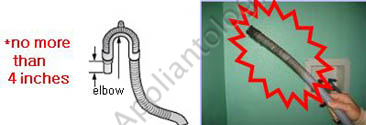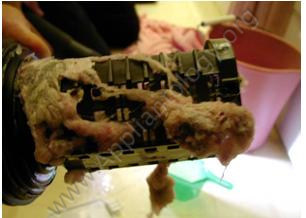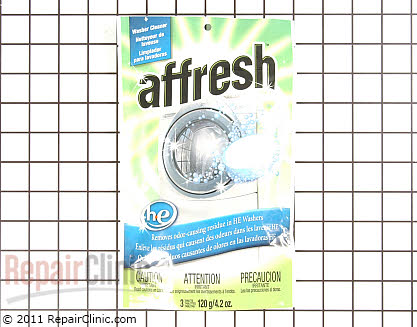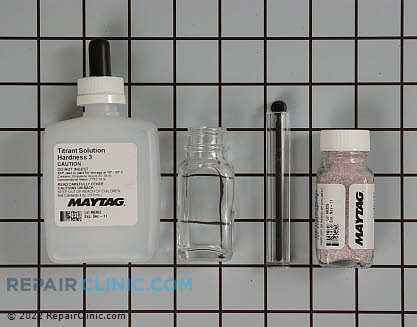9 Ways to Beat Odor Problems in Modern High-Efficiency Front Load and Top Load Washers
1. Use Only HE (High Efficiency) Detergent
And no, using a smaller quantity of conventional detergent is not the same as using HE detergent, as explained below. HE detergents are not simply a concentrated formulation of the regular stuff. Since front loaders and HE top loaders use much less water than conventional top loaders (about 12 gallons per wash load vs. about 56 gallons in a conventional top-loader), HE washers require a detergent with a whole different chemistry. You can read more about it in my magnum opus, High Efficiency Detergents, Front-Loading Washers, and the Great Unwashed.
If HE detergent is not used in these modern, low water-use washers, residue will accumulate in the outer drum and emit a foul odor. Or, as Martha, the sister of Lazarus observed, "Lord, by this time he stinketh."
"What's the best HE detergent to use," you ax? I gotta recommend Woolite Complete from the Reckitt-Benkiser folks who put on the awesome detergent training seminar for professional appliantologists at the Appliance Service Training Institute every year.
2. Run the "Tub Clean" Cycle Once a Month
Using either non-HE detergent or too much HE detergent will cause the build up of a residue called scrud (a mixture of scum and other crud). Once the Funk From Within (FFW) has taken hold inside the washer drum or tub, neither bleach nor vinegar will eliminate the odor. De-stinkification at this point involves scrud removal. You'll need to run a product called Affresh through it on the "Tub Clean" cycle. This cycle, combined with Affresh, is specially designed to remove scrud build-up.
If the washer doesn't have a "Tub Clean" cycle, then just run a hot water wash at maximum water level.
When running a Tub Clean cycle with Affresh, do not add any clothes or detergent. Just hot water and Affresh.
3. Reduce Detergent Use for Soft Water or Water Softener
Soft water will cause over-sudsing even when using HE detergent. To prevent scrud buildup, the amount of detergent used in each wash needs to be reduced to prevent forming suds during the wash cycle. If the water is very soft, as with some city waters where they soften it, the detergent usage will need to be reduced even below the recommended amount.
"But I like to see lots of suds in my washer because then I know my clothes are getting clean!"
You have to start with the understanding that the tumble action of high-efficiency washers (i.e., front loaders) produce more suds than the agitator action in top loaders. Now most of people think, “Oooo, sudsy, that’s good!” No, not good. Suds do nothing to clean your clothes and are actually an undesirable by-product of the detergent’s chemical interaction with the water.
Is it possible to know for sure what kind of water hardness you're dealing with? Ya sure, ya betcha! Just use this Maytag water hardness testing kit. You can read more about water hardness, what that means, and how it affects detergents.
General detergent guidelines for any front load or agitator-less top load washer with tub sizes 3.0 cu ft and larger is as follows (adjust as needed to eliminate undesirable sudsing):
HE: (2) Tablespoons Per Wash Load
HE 2X: (1) Tablespoon
HE 3X: (1) Teaspoon
4. Ensure Drain Hose is Installed Properly
If the drain hose is not installed properly, the unit will not drain properly. Additionally, if the washer drain hose is crammed so far down the drain pipe that it's submerged in the standing water in the pipe, it will do two things: 1) bring odors back up into the drum and 2) cause siphoning which, in turn, causes improper filling and other weird symptoms.

Never extend the drain hose more than 4 inches beyond the end of the elbow, and drain hoses should never be inserted more than 6 inches into drain.
5. Dry Door Gasket when Laundry is Finished for the Day
The door gasket on a front load washer should be wiped dry when the washer is finished working for the day. Water left in the bottom arc of the gasket is normal, since there is no suction pump attached to the gasket. However, if not dried out, stagnate water could begin to stinketh.
6. Periodically Inspect the Door Gasket and Clean Off Mildew as Needed
Periodically, check the door gasket on a front load washer for mildew buildup. If you're a bleach fan, mix 3/4 cup bleach with a gallon of hot water. Use the bleach mixture and a cloth to wipe out the gasket. (Do not use bleach alone. Undiluted bleach will damage the gasket.) Or, we've found that Simple Green works pretty good, too, and it's a little less fuss to use.
If the mildew cannot be removed, the gasket will have to be replaced. You can buy the replacement door gasket for any brand and model of front loader right here with a one year return policy. Most door gaskets you'll find here have a how-to replacement video that shows you exactly how to replace it.
7. Keep Washer Door Open or Lid Raised when Machine is Not in Use
After a cycle, small amounts of water are left in the machine. When finished with the unit for the day, dry the gasket (on a front loader) and leave the door open for a couple hours to allow the moisture to evaporate and dry out. On top loaders, just leave the lid raised.
8. Clean Detergent Dispenser Regularly
Once a week, remove the dispenser drawer and clean out the gookus in the sink with hot water and scrub brush.
9. Clean the Drain Pump Filter Regularly
Most front load washers have some type of "coin catcher" or screen for catching "gookus" -- that's a technical term we professional appliantologists use to refer to anything that ain't supposed to be there. This drain pump filter should be cleaned about once a month to prevent odors.
Remove the pump filter or coin catcher and scrub it under hot water to get all the nooks and crannies.

Accumulations of gookus on the drain filter like you see above prevents proper drainage and makes a great habitat for little stink-maker bacteria to grow, thrive, and stinketh.
-
.png) 3
3

.png.62a7d7300de75dfbd19764a318766630.png)






8 Comments
Recommended Comments